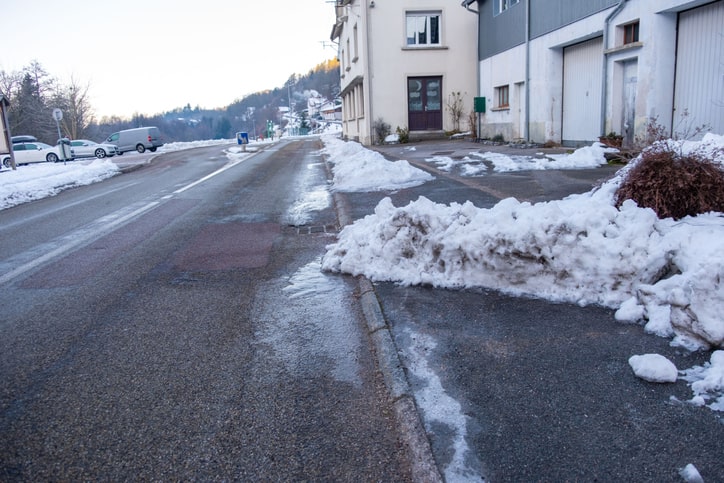How to Prepare Your Driveway for Winter and Snow
Can You Pave a Driveway in the Winter in Frederick, MD?
When winter rolls in, driveways face one of their toughest challenges: cycles of freezing, thawing, heavy snow, ice, and corrosion from de-icing chemicals. Without proper preparation, small cracks expand, potholes form, and your driveway’s lifespan shortens drastically. Taking the right steps now helps preserve your investment and makes snow removal much easier.
But can you pave a driveway in the winter? You can, as long as the winter is mild and the ground isn’t frozen. However, it’s best to handle driveway care activities before winter weather sets in. Here’s how Driveways 2Day recommends you get ready for the season in Frederick, MD.

Clean & Inspect Early
The first step in preparing your concrete driveway in the winter is a thorough cleaning and inspection. Begin by sweeping or power washing the surface to remove dirt, oil, seeds, and leaves that can break down the asphalt over time.
Once it’s dry, walk around the entire driveway to look for cracks, depressions, or other types of damage. For example, for an asphalt driveway, heaving in the winter is a concern. Pay particular attention to the edges and transitions near the street or garage, as these often wear out first. By identifying problems early, you’ll know exactly where repairs are needed before cold weather makes them worse.
Repair Cracks & Potholes
Minor damage may not seem urgent in the fall, but winter’s freeze-thaw cycles can quickly turn small cracks into larger problems. Filling cracks with flexible asphalt fillers prevents water from seeping in and expanding. Potholes should also be properly patched by removing loose material, compacting the fresh asphalt mix, and blending the repair into the surrounding surface. If you notice low spots or poor drainage, leveling these areas is just as important. Standing water will freeze, expand, and create more severe damage if left unchecked.
Sealcoating for Protection
Can you seal a driveway in the winter? Sometimes you can, but it’s best to handle this task before the first frost. Sealcoating is one of the best defenses against winter weather. Think of it as a waterproof shield that locks out moisture and protects against the salts and chemicals used to melt ice.
Ideally, sealcoating should be done in the fall when temperatures are still mild and dry conditions allow for proper curing. A quality sealcoat extends the life of your driveway and gives it a fresh, dark finish that enhances curb appeal. For most driveways, this protective layer should be applied every two to three years.
Gather Tools & Supplies
Once repairs and sealing are complete, it’s time to prepare for snow removal. A few simple choices can make a big difference in protecting your driveway during winter.
- Use plastic-edged shovels or snow blowers with adjustable blades to prevent scraping.
- Stock up on driveway-safe deicers such as calcium or magnesium chloride, and avoid harsh rock salt that can corrode asphalt.
- Place stakes or markers along the edges of your driveway so that plows and snowblowers don’t accidentally damage the borders.
- Store your equipment where it’s easily accessible before the first snowfall.
Maintain During the Winter
Even with preparation, consistent maintenance throughout the season is essential. Try to shovel early and often, before the snow becomes compacted and turns to ice. If you use a plow, raise the blade slightly so it does not scrape the asphalt surface. Deicers should be applied sparingly, only in areas where traction is needed, and any residue should be removed once conditions allow. By staying proactive, you’ll reduce wear and tear while keeping your driveway safe to use.
Extra Tips for Winter Care
Beyond the basics, there are additional habits that help your driveway last through the season. Driveways 2Day suggests:
- Avoid parking heavy vehicles in the same spot all winter, as weight combined with freezing temperatures can create depressions.
- Sweep away leftover deicer or sand once temperatures rise to keep buildup from breaking down the asphalt surface.
- Check gutters and downspouts to make sure water isn’t draining onto your driveway where it can freeze.
- Clear snow periodically as it falls rather than waiting for deep accumulation, which reduces strain on both your driveway and your equipment.
Contact Us for Driveway Repairs Before Winter
Preparing your driveway for winter may take some effort in the fall, but the results are well worth it. Ready to protect your driveway this winter or need to chat about paving a driveway in the winter? Contact Driveways 2Day for professional inspection, repair, and sealing services, and give your driveway the care it deserves before the snow arrives.
